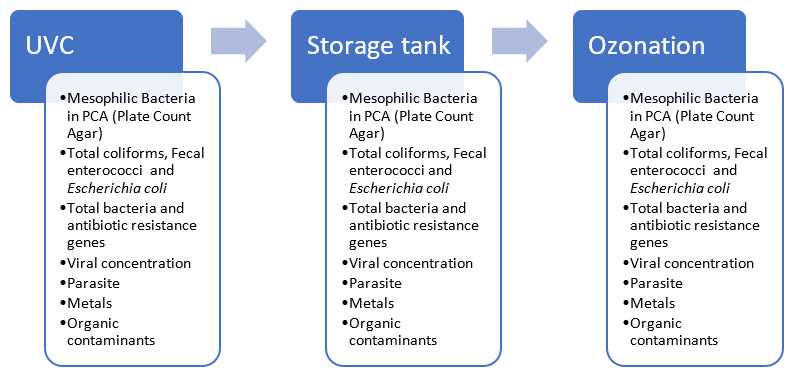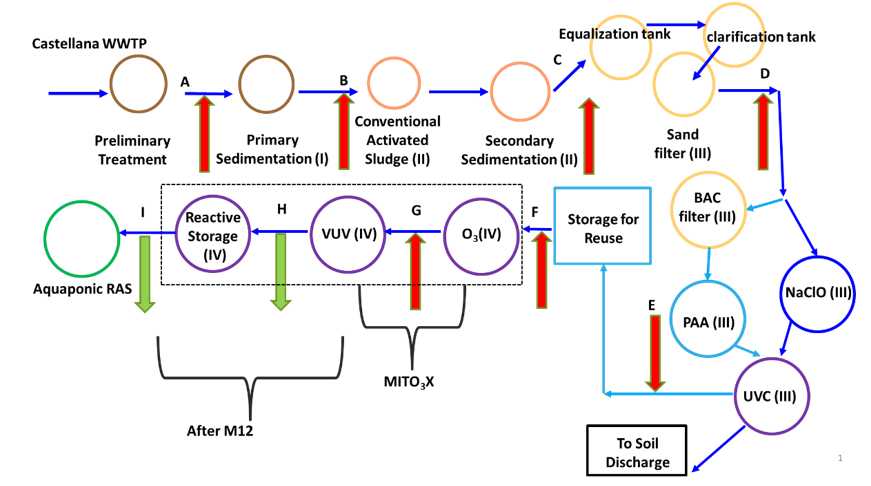WATER PRODUCTION FOR AWARE (Total Coliforms, Fecal Enterococci and Escherichia coli:)
Celia Manaia
water sampling
water processing
water analysis
waste water treatment
advanced tertiary treatment SOP
Disclaimer
Abstract
The protocol summarises the procedures used for analytical control. The protocol describes the
Standard Operating Procedure (SOP) for the optimization of advanced tertiary treatment of water, based on a comprehensive quality and risk assessment.
Steps
WATER PRODUCTION FOR AQUAPONICS
The water production for AWARE main activities includes three stages – disinfection by ultraviolet C radiation (UVC), storage for12h 0m 0s-24h 0m 0s(according to water load and season) and ozonation. The water quality is monitored at these three stages, for the parameters indicated in Figure 1 below.

Sampling, Processing, and Analyses
Water samples are collected (see Figure 2) and processed within a6h 0m 0sinterval, before being shipped for the partner responsible for the analyses (Table 1). In case no processing is needed, samples are frozen and stored at-80°Cwithin3h 0m 0s.
For each sampling event, the date, day of the week and hour; the temperature and rain. Sampling points, indicated in Figure 2 were designated from A to I:
-
Influent of primary treatment (A)
-
Influent of biological treatment (activated sludge) (B)
-
Treated secondary effluent (C)
-
Sand filter effluent (D)
-
UVC effluent (E)
-
Storage for reuse tank effluent (F)
-
Ozonation effluent (1 dose, e.g.,
5mgO3) - MITO3X technology - (G) -
Effluent of the vacuum UV oxidation (VUV) (H)
-
Effluent of reactive storage / Influent of the recirculation aquaculture system (RAS) (I)

Methods: The section below summarises the procedures used for analytical control – detailed protocols are annexed to this protocol.
Total Coliforms, Fecal Enterococci and Escherichia coli: Total Coliforms, Fecal Enterococci and Escherichia coli:
Analysis: Enumeration of culturable mesophilic bacteria at37°C
Method:
| A | B | C |
|---|---|---|
| 1 | Total coliforms E.coli | Colilet 18 (IDEEX) method |
| 2 | 1 | 100 mL of each water sample poured in sterile bottles from IDEEX kit |
| 3 | 2 | Adding of Colilert-18 reagent |
| 4 | 3 | Mix sample + reagent poured into the QuantiTray/2000 System |
| 5 | 4 | Incubation 18 hours, 35 °C ± 0.5 °C |
| 6 | 5 | Results analysis |
Reference:Go togo to step #2.3
− UNI EN ISO 9308-2:2014 Water quality - Count of Escherichia coli and coliform bacteria - Part 2: Most probable number method.
− EN ISO 11133:2014 - Microbiology of food, animal feed and water. Preparation, production, storage and performance testing of culture media.
| A | B | C |
|---|---|---|
| 1 | Fecal enterococci | Enterolert E system (IDEEX) |
| 2 | 1 | 100 mL of each water sample poured in sterile bottles from IDEEX kit |
| 3 | 2 | Adding of reagent |
| 4 | 3 | Incubation 24 hours, 41 °C ± 0.5 °C |
| 5 | 4 | Results analysis |
Reference:Go togo to step #2.3
− UNI EN ISO 7899-1:2001 - Water quality - Research and enumeration of intestinal enterococci - Miniaturized method (Most Probable Number) for surface and wastewater.
− EN ISO 11133:2014 - Microbiology of food, animal feed and water. Preparation, production, storage and performance testing of culture media.
Observations: Samples were processed and analysed withinDuration 12h 0m 0s after collection.
Parameters framed by Legal and Regulatory Requirements:
Using the EU Drinking Water Directive:
Mesophilic Bacteria in PCA (Plate Count Agar) – 0 CFU/100mL
Total coliforms and Escherichia coli –Number /100mL (0 MPN/100mL)
Fecal enterococci –Number/100 mL (0 MPN/100mL)
Viral concentration - There are no legal requirements for viruses. They are not included in any regulation now.
Parasite - EU legislation (2020/741)
Metals - DIRECTIVE 2008/105/EC OF THE EUROPEAN PARLIAMENT AND OF THE COUNCIL of 16 December 2008 on environmental quality standards in the field of water policy
Organic contaminants - DIRECTIVE 2008/105/EC OF THE EUROPEAN PARLIAMENT AND THE
COUNCIL of 16 December 2008 on environmental quality standards in the field of water policy.

